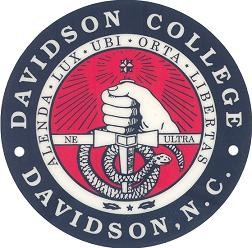Opinion
Thursday, May 8, 2014
News / Opinion Enough about the laundry already! Here's the more important story unfolding at Davidson College
Posted By Ana McKenzie on Thu, May 8, 2014 at 2:33 PM
While local media beats to death Davidson College's recent announcement that it would cease its decades old - and, frankly, antiquated - laundry service, in which the university washes, folds and irons students' clothing for free, we're all missing out on something more important happening on campus.
Tuesday, April 22, 2014
News / Opinion General Assembly, look under every cushion before abandoning teacher raises
Posted By Andria Krewson on Tue, Apr 22, 2014 at 9:00 AM
As the state tries to figure out how to give teachers raises, one pot of money often gets overlooked: the $82 million or so that N.C. grants to private colleges to help in-state students pay tuition. It hasn't been on the radar - much less on the table - as a potential source of teacher pay. It should be.
The N.C. Legislative Tuition Grant program began in 1975, when baby boomers headed to college, to provide tuition grants to N.C. undergraduates attending approved private state institutions. That money benefits Queens University, Davidson College, Johnson C. Smith University and Johnson and Wales University, among other schools. The school that has benefited the most from the tuition grant in recent years? Campbell University. A school that benefits that you might not have heard of? University of Mount Olive.

Wednesday, March 19, 2014
Opinion Nine better reasons why Charlotte is weird
Posted By Kimberly Lawson on Wed, Mar 19, 2014 at 5:00 PM
The Huffington Post published a story today offering 15 reasons why Charlotte is weird.
No, HuffPo, your list is weird. I can appreciate snark and tongue-in-cheek and all that, but if that was indeed the intention, you missed the mark.
I'll give you your props, HuffPo, in that a few items rang true. Yes, it's a little odd that our downtown area is called Uptown (but after a year or two living here, you get over that). And those murals at Bank of America Corporate Center are definitely strange.
But the rest of your list is crap. It's not informed. It's not funny. It's not even relatable, like that Onion article was. The fact that you had to resort to using a JLaw GIF clearly shows this list was half-assed.
In no particular order, and in no way complete, here's a real list of why Charlotte is weird.
Wednesday, March 5, 2014
News / Opinion CIAA tournament stays in Charlotte - cue the mixed reactions
Posted By Kimberly Lawson on Wed, Mar 5, 2014 at 4:34 PM
Sorry, Raleigh and Atlanta - the Central Intercollegiate Athletic Association is staying in Charlotte.
On March 3, CIAA commissioner Jacqie Carpenter announced that the Queen City will continue to host the men's and women's annual basketball tournament - which takes over the city for almost a week, bringing with it thousands of visitors and hundreds of parties and events - for at least another six years. In addition, the conference will move its headquarters, in Hampton, Va., here.
Cue the respective cheers and groans.
This was the first time in six years that I did not attend a tournament week party. (I've been on both sides of the bar since the CIAA first came to Charlotte in 2006, so service industry folks, I know the exhaustion of working a crowded party.) But I did experience some of the excitement in Uptown Saturday night while walking around, losing myself in the crowd of cheerful out-of-towners who were in our city to have a good time.
A good time. That's all the alumni and friends of these 12 historically black colleges and universities are looking for when they visit Charlotte. (Not unlike the visitors who come to the area for the big NASCAR race or the ACC championship game.) That Charlotte has the capacity to host such an event and get something in return makes me wonder why anyone would not embrace the news that the CIAA will return through 2020.

- CharlotteVibe.com
- The CIAA 2014 Step Show Throwdown; Greeks vs. Greeks took place at Grady Cole Center, Feb. 28.
Wednesday, February 26, 2014
News / Opinion Duke and DENR sittin' in a tree... (w/video)
Posted By John Grooms on Wed, Feb 26, 2014 at 5:19 PM
When you're already screwing things up, why not go for broke? That could be the thinking behind the latest coal ash-related decision at the N.C. Department of Energy and Natural Resources. Or maybe thinking doesn't have much to do with it. As WRAL in Raleigh reported, DENR officials told a Superior Court judge that they may reinstate, and even expand, the coal-ash "settlement," or consent order, the agency reached with Duke Energy over coal ash spills at two sites. DENR, you may remember, had withdrawn the consent order shortly after the Feb. 2 Dan River coal-ash debacle. The order would have fined Duke a measly $99,000 and allowed the utility to decide when and how to handle its coal-ash ponds; the order was announced just in time to legally bar environmental groups from suing Duke. That weak slap on the wrist is believed to be the impetus for a federal investigation, announced last week, into whether DENR and Duke colluded in order to keep costly lawsuits by environmentalists at bay.
So why would DENR want to reinstate the consent order? Lawyers for DENR say the agency may add new provisions to the order, or may "expand the overall scope of the Consent Order to include additional facilities." One could interpret DENR's explanation to mean it will add more penalties to the order; or it could mean that DENR plans to fold all 14 Duke-owned coal ash ponds into the agreement, which could legally reduce the likelihood of Duke having to pay massive fines for its coal-ash carelessness. There is little doubt in environmentalists' mind which of those possibilities is behind DENR's unexpected reinstatement of the consent order.
D.J. Gerken, senior attorney at Southern Environmental Law Center, told WRAL, "DENR is apparently considering the possibility of shielding more Duke Energy coal ash pits under its do-nothing settlement deal with Duke, which requires no real action to clean up those coal ash lagoons." If Gerken is right, it would be a stunningly brazen decision from DENR which is already on the N.C. public's shit list for going light on a company that has covered 70 miles of riverbed with up to 40,000 tons of toxic coal ash. Perhaps DENR honcho John "Oil is a renewable resource" Skvarla knows the jig is up and he's bucking for a job with Duke Energy after he leaves government. Or maybe DENR and the McCrory administration are freaking out over the federal investigation and they're throwing anything out there to try to save their butts, and hoping something sticks. Either way, DENR's new "strategy" could be the only good coal ash news Duke gets for awhile, coming as it did the day before another report - this one from the Public News Service - revealed that some highly successful companies, including several in North Carolina, are paying little to no federal income tax. Duke Energy, one of the companies in the report, made $9 billion in profit during the past eight years but paid zero federal income tax.
On Tuesday, activists gathered in front of Duke Energy to protest the company's treatment of coal ash. Duke eventually accepted the petition mentioned in the video.
Tuesday, February 25, 2014
News / Opinion Venezuelans in Charlotte join countrymen around the world in peaceful protest
Posted By Ailen Arreaza on Tue, Feb 25, 2014 at 9:39 AM
The first time I went to Venezuela to meet and visit with my soon-to-be husband's family, I purchased a refrigerator magnet in the Caracas airport of the Cuban and Venezuelan flags joined together. I knew that the reason the magnet existed is because of Cuba and Venezuela's political ties, ties that would lead the wealthy South American oil producing nation down the same path of totalitarianism, scarcity and human right violations as the paradisiacal Caribbean island from which I hail, but I bought the magnet anyway. Today, eight years later, it's still on our fridge and holds a picture of the beautiful American family Tony and I have made out of his Venezuelan and my Cuban roots. In our home, that magnet is a cutesy representation of our union, but in broader political terms, it signifies a toxic partnership between two of the most ruthless and divisive dictators on this side of the planet.
It's possible that you might not have heard about what's been happening in Venezuela over the past couple of weeks - American media seems much more preoccupied with the crisis in Ukraine - but the situation in the South American country is critical, and it's only getting worse.
Thursday, February 20, 2014
News / Opinion Regarding Reid's, Charlotte Observer misses an opportunity
Posted By Ana McKenzie on Thu, Feb 20, 2014 at 2:49 PM
On Monday, the Charlotte Observer published a story about an employee at a local specialty food store who was fired after telling Gov. Pat McCrory, a customer, "thanks for nothing." The story has been picked up by MSNBC, the Huffington Post, and the Guardian. The Observer's editorial board has since weighed in, kicking off a piece - that seems to have been written entirely by commenters of the news story - with a reference to McCrory's golf game?
Odd metaphors aside, the editorial board's point is this: On Sunday, McCrory missed an opportunity to come off as "magnanimous" by not respectfully engaging the employee following his comment.
But here's where the Observer - both the news department and the editorial board - come off as anything but.
Thursday, February 6, 2014
News / Opinion BREAKING: Protest of Duke Energy coal ash policies set for noon Thursday
Posted By John Grooms on Thu, Feb 6, 2014 at 10:41 AM
Good for the Charlotte Observer. This morning their editorial page calls for Duke Energy to finally do something about its coal ash ponds. Four days after a Duke coal ash poind started leaking harzardous chemicals into the Dan River, there is still no word from Duke that it is even considering revising how it deals with leftover coal ash. That's not remotely good enough. The Dan River mess is a terrible reminder that critics of coal ash ponds have been right along about the disastrous potential of these unlined, ill-tended sludge pits. Here is a key excerpt from the Observer's editorial:
What can Duke do? Clean the unlined ponds. Recycle the coal ash or move it to dry, lined landfills. That's what two South Carolina utilities have agreed to do in settling a lawsuit with the Southern Environmental Law Center, Catawba Riverkeeper and other groups. Yes, moving the coal ash is more expensive than leaving it where it is, but it's nowhere near the legal and financial cost of a coal ash failure that contaminates a water supply.
You can read the rest of the editorial here if you have a digital subscription to the daily.
Tuesday, February 4, 2014
Opinion About that banner Common Market took down this week...
Posted By Erin Tracy-Blackwood on Tue, Feb 4, 2014 at 2:58 PM
This week, the jury selection begins for Jordan Davis, a black teen in my hometown, in Florida, who was shot by a white man in an argument that started when the white man demanded that Davis turn his music down.
This week, there is national outrage at two beloved, iconic brands for having the audacity to acknowledge in their most high-profile advertising of the year, that cultures other than white exist in America.
This week, Richard Sherman wore a shiny new Superbowl ring, in addition to having a degree from Stanford, the second highest GPA of his graduating class and a successful charity providing school supplies to underprivileged children. Despite all these things, he is referred to as a "thug" for his dreadlocks and unapologetic pride in his accomplishments.
This week is the first Monday of a month dedicated to black history, which exists because during the other 11 months of the year, only European white history is covered in our children's' school textbooks.

Wednesday, January 29, 2014
News / Opinion Obama executive orders I'd love to see
Posted By John Grooms on Wed, Jan 29, 2014 at 1:07 PM
Well, that took Obama long enough, didn't it? After five years of endless obstruction by the far-right GOP nihilists in Congress, Obama finally decided to rely on executive orders in order to get anything done. Since last night's State of the Union address in which the president shared his new strategy, the usual goobers' cries of "socialist," "dictator" and such haven't stopped. Frankly, though, what did the tea partiers expect would happen if they kept making it nearly impossible for Congress to pass anything important? I am not comfortable with government by executive order, and there are serious limits on what a president can really do on his/her own, but as long as Republicans continue to fantasize about dictators throwing executive orders around, I say give 'em what they're expecting. With that in mind, here are some executive orders I'd like to see Obama hand out in the next few months.

- Wikipedia
- Seeger gets his due








